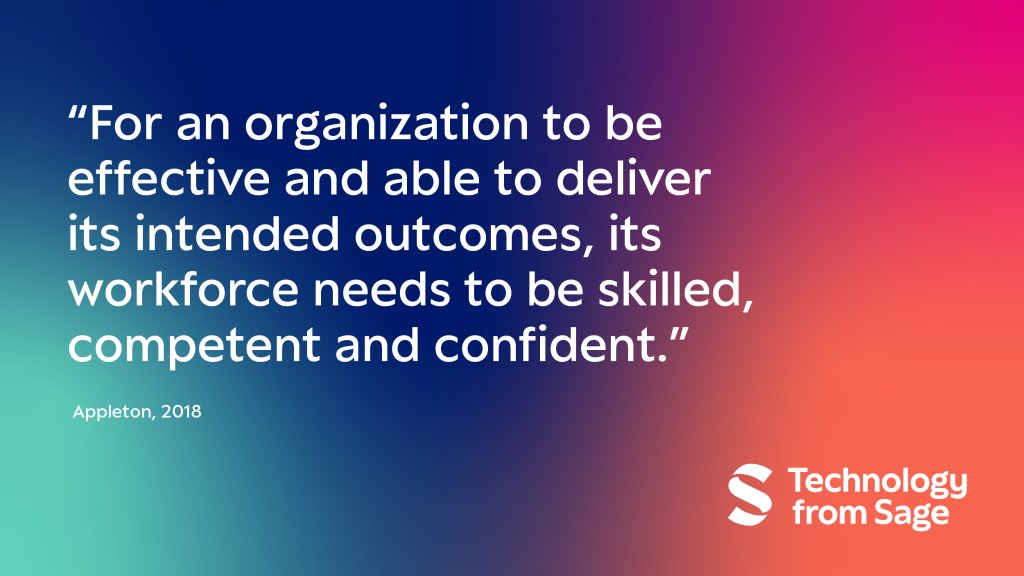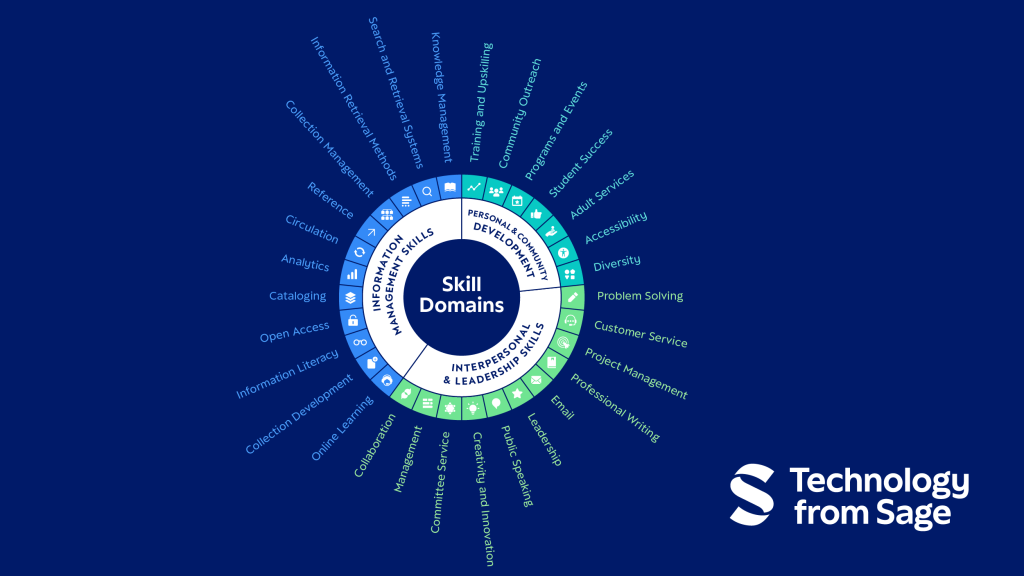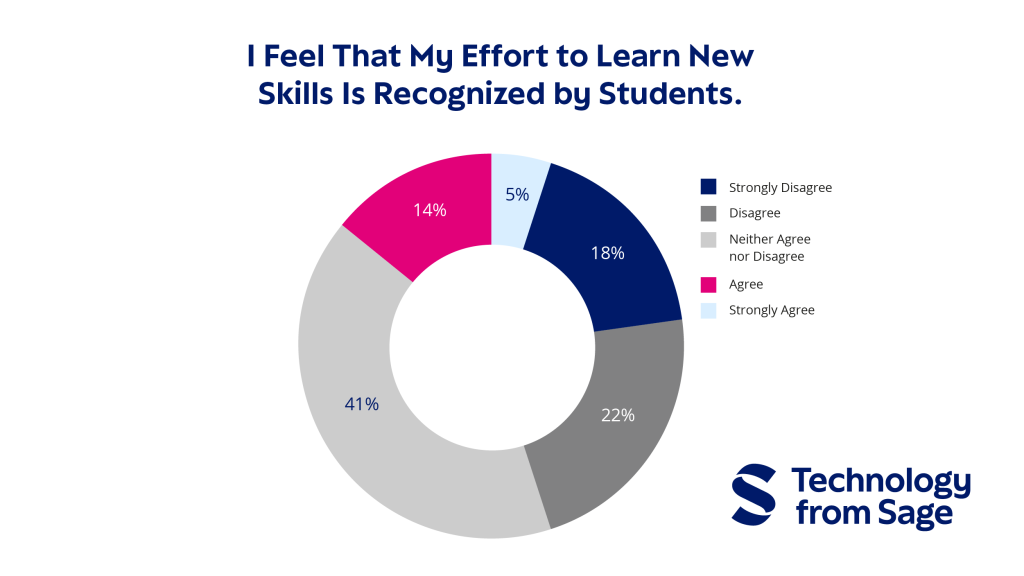We recently launched our Librarian Futures Part Three report, titled The Librarian Skills Gap. The report, in partnership with Skilltype, explores the emerging skills required to fulfil a library’s mission – in a decade shaped by social, political, and technological change – and meet the needs of today’s library patrons. We gathered global perspectives from over 2,000 academic library professionals, from frontline librarians to library directors, to ensure a representative set of insights for the report.
Our second Librarian Futures report asked the question: How can academic libraries be more deeply involved in the undergraduate learning journey? The new report investigates the new skills, competencies and responsibilities which librarians will develop in the years ahead and are going to be pivotal to this. We hope this report inspires conversations in your library, amongst your peers, and within the wider library community.
Here are the 9 key findings from Librarian Futures Report Part Three:
An overwhelming majority of librarians agreed or strongly agreed with the following statements:
Results were much more mixed for the statement “I feel confident regarding advancing my career”.

Although some are neutral on this question (17%), and a small number do not feel able to meet these challenges (8% disagree, 1% strongly disagree).
74% of respondents reported that they engaged in upskilling, on average, at least once every 3 months.
However, many librarians are being left out of such conversations, and the impact is particularly pronounced for staff without postgraduate qualifications and for staff working in a hybrid fashion and over 10% of library professionals surveyed as only upskilling once per year.
This is likely in response to the rapid rise of generative AI.
Moving into the medium and long term, a number of librarians see skills in learning analytics being crucial to develop.

Over half of respondents agreed or strongly agreed that they were given ample opportunity to develop their skill set by the university (56%), and over half felt well supported to do so by senior management (62%), line managers (80%), and colleagues (72%).
Just 19% of respondents felt that students recognise their efforts to learn new skills. A plurality (41%) of librarians were neutral on the topic, while a relatively huge 40% of librarians actively disagreed with the statement.

Approximately 75% of librarians have had the opportunity to engage in upskilling at least quarterly.
It is also worth noting that librarian training is coupled within travel budgets, which has increased the impact of COVID on librarian training budgets.
The next most popular choice was “other,” with respondents specifying their different ways of discovery. Some respondents described using online platforms such as Coursera or LinkedIn to discover new learning, while others spoke of having to undertake mandatory training.
Download our Librarian Futures Part III report to discover more noteworthy insights regarding the emerging skills required to fulfill a library’s mission and meet the needs of today’s library patrons.
Share your thoughts about the findings in the new Librarian Futures Part III report on Twitter and LinkedIn.
New Librarian Futures report sheds light on librarian perspectives on the current librarian skills landscape November 3, 2023
Based on Skilltype data and a Librarian Survey, the new Technology from Sage report explores the current librarian skills landscape and identifies areas for further development.
The second Librarian Futures report asked the question: How can academic libraries be more deeply involved in the undergraduate learning journey? This new report, in partnership with Skilltype, explores the emerging skills required to fulfil a library’s mission – in a decade shaped by social, political, and technological change – and meet the needs of today’s library patrons. We gathered global perspectives from over 2,000 academic library professionals, from frontline librarians to library directors, to ensure a representative set of insights for the report.
“Technology from Sage is proud to be a strategic investor in Skilltype, supporting their mission of building librarian skills for the future. I’m delighted that we could collaborate with Skilltype on this important report on librarian futures, helping Tony and his team share their unique insights on librarian skills – both where we are now, and what’s needed in the coming years.”
Matthew Hayes, PhD, MD, Technology from Sage
“Our aim with this collaboration is for information professionals and their teams gain new perspectives on the competencies they should be cultivating within their personal repertoires and their organizations. Librarians, and the new skills, competencies and responsibilities they will develop in the years ahead, are going to be pivotal to this. But it all starts with increased dialog, understanding where we are and where we want to go. I hope this report contributes to that dialog and inspires conversations in your library, amongst your peers, and within the wider library community.”
Tony Zanders, Founder and CEO, Skilltype
We believe the right technology can remove barriers to knowledge. So, we curated a suite of library technologies that improve your patrons’ workflow – from managing reading lists to discovering online resources and reference management. Whether used individually or in combination, our technologies amplify the library’s value on campus, prepare your library for the future, and are backed by the Sage name you already trust.
Find out more at: www.technologyfromsage.com
Skilltype is a talent management platform designed for libraries to analyze, develop, and share expertise. Founded in 2018, the platform uses linked data to help libraries identify skill gaps across their organization, create personalized training plans for employees, and identify opportunities for collaboration. Skilltype is based in Baton Rouge, Louisiana with offices in New Orleans and Boston.